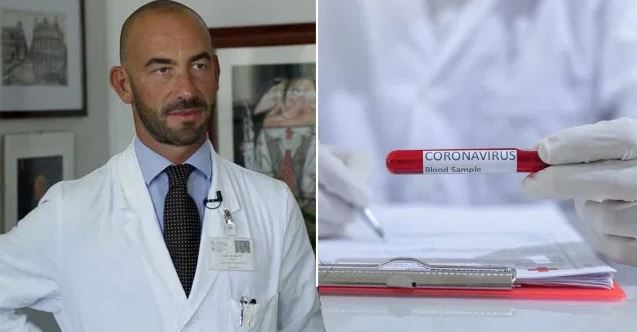Coronavirus Is Getting Weaker And May Die Out On Its Own Without A Vaccine, Italian Expert Claims
Posted by Amarachi on Mon 22nd Jun, 2020 - tori.ngProfessor Matteo Bassetti
A top Italian doctor has claimed that the deadly Coronavirus is getting weaker and could die out on its own without a vaccine.
Professor Matteo Bassetti said he is convinced the virus is "changing in severity" and patients are now surviving coronavirus infections that would have previously killed them.
He described coronavirus as once an "aggressive tiger" of a disease, which has now weakened and turned into more of a wild cat. If the virus keeps getting weaker, there's a chance COVID-19 could disappear without a need for a vaccine.
Professor Bassetti has continually said that in recent months, patients with the virus seem to be handling it much better than they were at the beginning of the global pandemic in Italy.
Professor Bassetti suggests that the strain of coronavirus could be mutating and becoming weaker, making it less lethal. He also suggested that improved treatments and more social distancing could be the key to why people are handling the virus better than before.
Bassetti, the chief of infectious diseases at San Martino General Hospital in Genoa, Italy, told The Sunday Telegraph: "It was like an aggressive tiger in March and April but now it's like a wild cat.
"Even elderly patients, aged 80 or 90, are now sitting up in bed and they are breathing without help.
"The same patients would have died in two or three days before."
He believes that one of the reasons the virus might be causing less serious illnesses is a genetic mutation which has made it less damaging to people's lungs.
The Professor added: "The clinical impression I have is that the virus is changing in severity.
"In March and early April the patterns were completely different. People were coming to the emergency department with a very difficult to manage illness and they needed oxygen and ventilation, some developed pneumonia.
"Now, in the past four weeks, the picture has completely changed in terms of patterns. There could be a lower viral load in the respiratory tract, probably due to a genetic mutation in the virus which has not yet been demonstrated scientifically."
However, other scientists have hit back at the claims, saying that there is no scientific evidence that the virus has changed at all.
In response to Professor Bassetti's claim, Dr Angela Rasmussen, from Columbia University, tweeted: "There is no evidence that the virus is losing potency anywhere."
She added less transmission means fewer hospitalisations and deaths, but warned: "That doesn't mean less virulence."
The virulence of a virus is how dangerous the illness is, but may not be directly related to how contagious it is.
Dr Oscar MacLean, of the University of Glasgow, added: "These claims are not supported by anything in the scientific literature, and also seem fairly implausible on genetic grounds.
"The vast majority of SARS-CoV-2 mutations are extremely rare, and so whilst some infections may be attenuated by certain mutations, they are highly unlikely to be common enough to alter the nature of the virus at a national or global level.
"Making these claims on the basis of anecdotal observations from swab tests is dangerous.
"Whilst weakening of the virus through mutations is theoretically possible, it is not something we should expect, and any claims of this nature would need to be verified in a more systematic way.
"Without significantly stronger evidence, no one should unnecessarily downplay the danger this highly virulent virus poses, and risk the ongoing society-wide response."
Dr Seema Yasmin, an epidemiologist from Stanford University, said the idea was "bulls**t."

















































